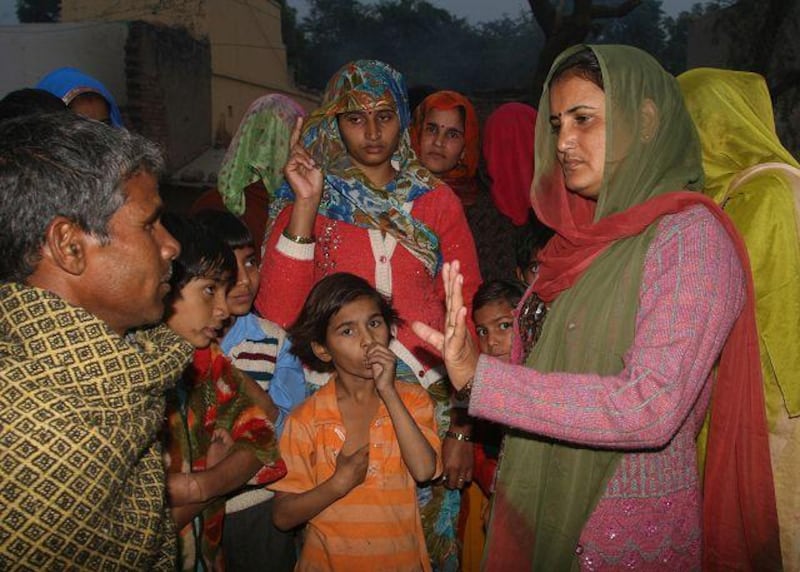KOTHAL KHURD // Brijesh Kumar used to spend half of his daily wage each night on alcohol. When his wife asked for money for food and household expenses, he beat her. Unable to bear the abuse, Munni Devi would stay away from her house for hours in the evening until her husband fell asleep. This routine continued for more than two decades.
"But four years ago, when Roshni Devi organised the women in action against our village's drunkards, my husband was forced to stop taking alcohol," said Ms Devi, a 40-year-old resident of Kothal Khurd village in Haryana's Mahendragarh district. "I had never dreamt that any power could correct my husband and peace could ever return to my family." She was referring to Roshni Devi, the village chief who led a successful anti-alcohol campaign. In July, India's president, Pratibha Patil, invited Roshni Devi, a Dalit, or low caste, Hindu woman to her residence in Delhi and said that her movement's achievement proved that the "most difficult of challenges in society can be overcome with courage, dedication and confidence".
In most of Haryana's villages many day labourers are alcoholics who squander most of their earnings on drink, leaving their wives, children and families to fend for themselves, according to the anti-alcohol campaigners. In Kothal Khurd, about 20 per cent of the village's 415 Hindu families are headed by Dalit men who work as day labourers on farms, and almost one quarter of them were alcoholics just a few years ago, according to Mr Kumar, who has turned to helping campaign against drink. "At least one third of the men in our [Dalit] community took alcohol every day, in the evening. As it happened in my case, the families suffered badly in all terms and many incurred bad debts. With men spending more than half of their wage on alcohol bottles, little money would be left for their families and the situation forced the women to go to work and children to drop out of the schools," Mr Kumar said. "Alcohol was sending all of us on the path to ruin."
But the situation began changing in Kothal Khurd in 2005 when Roshni Devi took a vow to eradicate alcoholism from her village and organised the women to fight off the menace. Ms Devi, the only Dalit university graduate from the village and a mother of two sons, listened to the women speak of their sufferings and told them that they could help their husbands shun alcohol if they collectively stood up to them.
Hoping to add more political muscle to her movement, in 2005 Ms Devi contested the local Panchayat, or village administration, elections for the seat of sarpanch, or head of the administration, newly reserved for a Dalit candidate. Because of her fight against alcoholism, she was so popular among women and non-drinking men that she polled more votes than all nine of her Dalit male opponents combined.
However, Ms Devi's election did not go down well with everyone in the Hindu-majority village. "On the first day as I held my office as the sarpanch, some upper-caste men said they could not accept the authority of a woman in the village. When I said that I would do my best to empower the women and strengthen the movement against alcoholism, a drunken man pulled me out of my office in the presence of other men," Ms Devi said.
"But by trying to humiliate me that way, in fact they emboldened me further on my key mission against alcohol." Ms Devi was soon able to help enact a resolution seeking the closure of the liquor shops within 1km of the village. This led to three such stores being shut down. But because some Kothal Khurd men still managed to obtain liquor at far-off shops and return home drunk, Ms Devi's group formed teams made up of Dalit as well as upper-caste women to confront the drunkards in the village.
"We caught many drunken men and abused them publicly for taking alcohol despite our repeated appeals to stay away from drinking. In some cases we even assaulted some men who tried to abuse us," said Ram Kali Devi, wife of a day wage labourer who was forced to quit his 10-year drinking habit in 2005 after Roshni Devi launched her movement. "Soon, as a number of alcohol users began dwindling in our village, we knew that our action was working," she said. "All families in Kothal Khurd are in peace because alcohol is not a hurdle on its development any more."
In other Indian states alcoholism is also often blamed for domestic violence and poverty. Sometimes women, mostly wives of alcoholics, have formed groups that have forced alcohol shops to close. However, according to Shivtaj Singh, a local social activist and professor at the government college in the nearby town of Narnaul, "In nearly all cases the women-led prohibition movements finally failed because they did not get the necessary support from local police.
"Police get bribes from such illegal liquor shops on a regular basis. If these shops are stopped they will lose their cuts. So police never take action against such mushrooming bars," he said. "Roshni Devi has succeeded in her movement against alcohol addicts in her village because she spearheaded the movement while being the sarpanch of the village. Administrative officials supported her and so police were forced to shut down the liquor shops around Kothal Khurd."
The success of the Kothal Khurd movement has spurred women in about 20 of Haryana's villages to set up alcohol resistance groups. "Only the collective resistance by women can put a halt to their men's drinking habits," Roshni Devi said. "On our successful mission we have also discovered that women too can wield power and can enforce positive changes in a society." @Email:foreign.desk@thenational.ae





